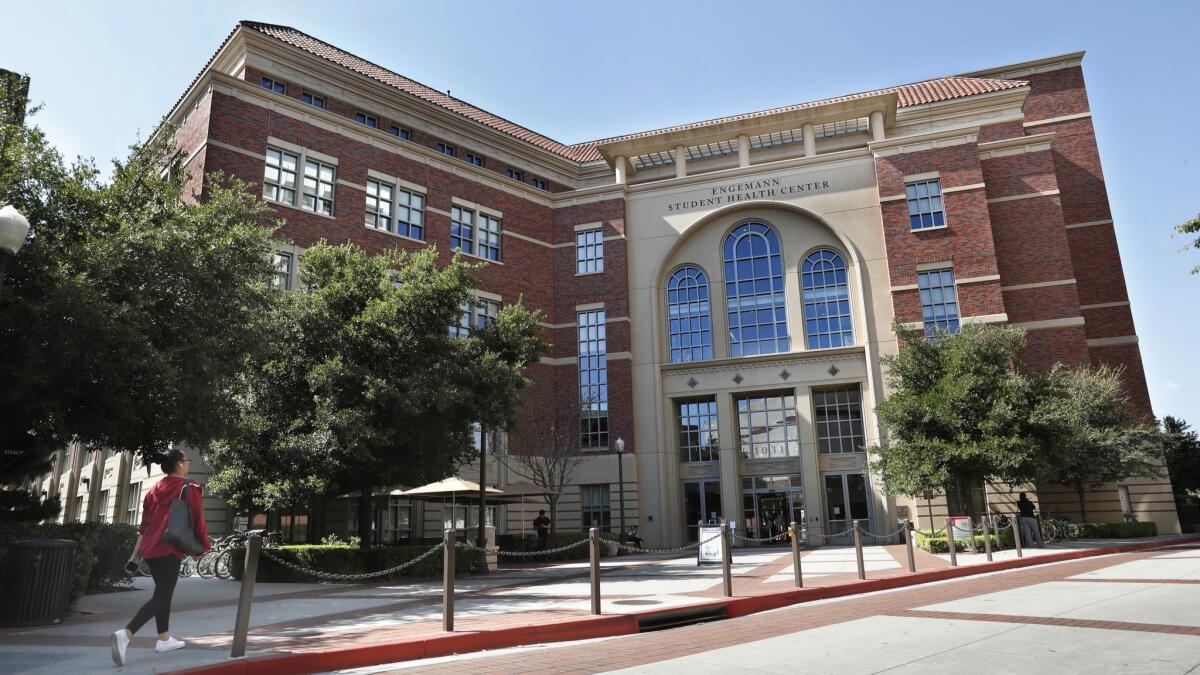USC lawyer says secret deal with accused campus gynecologist ‘worked efficiently’

- Share via
Testifying before legislators at the state Capitol on Monday, an attorney for USC defended its response to misconduct reports against a campus gynecologist, saying the university’s decision to force the physician out through a secret internal process “worked efficiently.”
“The doctor was suspended and removed from the patient setting,” said Keith Carlson, an outside lawyer for USC. He added that from the time the university launched the investigation in June 2016 that led to Dr. George Tyndall’s departure, he “never saw another USC student.”
The lawyer’s statements to a committee looking into how the medical profession deals with sexual misconduct complaints struck a different tone than previous messages in which university officials have expressed regret about their handling of Tyndall.
Administrators have said that while USC did not have a legal duty to report Tyndall to the state medical board, the agency that protects the public from problem doctors, they should have done so anyway.
Since The Times revealed the long history of complaints against Tyndall, more than 400 people have contacted a hotline for former patients to report misconduct. The Los Angeles Police Department said it has been in contact with 135 women about Tyndall and served search warrants at the doctor’s home last week. In lawsuits and interviews, women have alleged mistreatment by Tyndall dating to the late 1980s, with many saying they had thought their experiences were isolated until reading The Times’ report.
Tyndall has denied any misconduct and said the care he provided was thorough but appropriate.
In his testimony in Sacramento to a committee chaired by state Sen. Jerry Hill (D-San Mateo), Carlson suggested that dealing with Tyndall quietly as a human resources matter was “far more efficient” than pursuing the sort of “peer review and investigation that often results in a report to the medical board.” He said that Tyndall alleged during the investigation that he was being retaliated against as a whistleblower, raising the prospect in the university’s eyes that he might sue to get his job back.
USC offered Tyndall a monetary settlement to resign and he accepted. The terms are confidential.
The university “chose to enter into a settlement agreement [with Tyndall] to eliminate the chance of him ever being reinstated by a court,” Carlson said. At the time, he said, no patients had alleged “actual sexual misconduct” and Tyndall, then 70, told administrators he planned to retire.
Another USC representative briefly addressed the committee and offered apologies to Tyndall’s patients. Martha Escutia, vice president of government relations, said, “We have made significant changes in leadership, policies and procedures at the student health center and are confident this will not happen again.”
The lawyer’s testimony came in for heavy criticism by other committee witnesses. John Manly, an attorney who represents more than 100 former patients, ridiculed his description of the process as efficient.
“It was efficient in hiding systemic molestation and abuse of women,” Manly said. “It was not efficient in helping my clients or the victims.”
Lucy Chi, a 2014 graduate who was treated by Tyndall and is now suing the university, said administrators should have gone to the police about the gynecologist when complaints first surfaced in the 1980s.
“USC was complicit in putting tens of thousands of women in danger of sexual abuse by George Tyndall,” Chi said. Of Carlson’s contention that the university investigation in 2016 turned up no patient complaints of sexual misconduct, she said, “I wonder what questions they were asking and who they were asking.”
The scandal over how USC handled complaints against the physician has roiled the campus and led to the departure of the school’s president, C.L. Max Nikias. USC hired the law firm O’Melveny & Myers to investigate Tyndall and “reporting failures” at the campus clinic.
The U.S. Department of Education announced earlier this month that it has launched an investigation into how USC handled the misconduct complaints and rebuked the university for what it alleged was improper withholding of information about Tyndall during a previous federal investigation.
More to Read
Sign up for Essential California
The most important California stories and recommendations in your inbox every morning.
You may occasionally receive promotional content from the Los Angeles Times.











